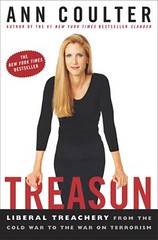Yeah, But Ann Coulter's A Lot Better Looking Than Margaret Cho!
In response to this post, ChefJef writes the following:
Juan Cole is clearly on the fringe of Left thought. Even though I agree with some of his premises – but certainly not all - the language in which he encases them is offensive. Still, I don’t think the Belmont Club “smack down” retort is entirely full of merit. While Cole, unfortunately, reverts to “name calling,” people like Rush Limbaugh and Gordon Liddy have been “name calling” liberals for years. Further, I don’t think “[T]he weakening of the traditional media and the stresses caused by war have created a kind of 'play' in the system which now allow unchained weights to crash about” is an explanation for the seeming increase in incivility between the Right and Left; American society, as a whole, has degraded considerably in the exercise of civility, in both red and blue states, and the political scene has concomitantly degraded as well.
Moreover, while the Left has some “ridic” spokes persons such as Garofalo and Cho, the Right’s Coultier and Liddy are no farther away from “buffoonery” than the former.
Nonetheless, I think there are more similarities between Red and Blue America than people realize. Unfortunately, both sides are missing important points. For example, there is a measure of political common ground, I think, between the University-type liberals, among whom I’ve spent many years, and evangelical churches that are thick with Republicans; the red-blue polarization is mostly (NOT entirely – there are some basic philosophical differences on some issues - but mostly) a consequence of which issues are on the table -- and which ones aren't. Change the issue menu, and those electoral maps may look very different. Imagine a presidential campaign in which the two candidates seriously debated how a loving society should treat its poorest members. Helping the poor is supposed to be the left's central commitment. In practice, the commitment has all but disappeared from national politics. Judging by the speeches of liberal Democratic politicians, what poor people need most is free abortions. Anti-poverty programs tend to help middle-class government employees; the poor end up with a few scraps from the table. Teachers' unions have a stranglehold on failed urban school systems, even though fixing those schools would be the best anti-poverty/ anti-crime program imaginable.
Most liberals I know do not like this state of affairs, and neither do most of my church friends, who regard helping the poor as both a passion and a spiritual obligation, not just a political preference. These evangelicals vote Republican not because they like the party's policy toward poverty -- cut upper-income and capital gains taxes and hope for the best -- but because poverty isn't on the table anymore.
But, ironically, however erroneously we got to it, the moral-values debate is precisely the one Democrats need to be having right now. Because if they don't capture the moral high ground back from the Republicans, they'll never be able to capture the hearts and votes of Red America.
If the Democratic Party is not about bringing focus and urgency to the creation of a more fair, just -- and, yes, moral -- society, it might as well cease to exist. FDR gave expression to the moral principle that should be animating Democrats when he said that “the test of our progress is not whether we add more to the abundance of those who have much; it is whether we provide enough for those who have too little.” America's Founding Fathers understood the connection between statecraft and soulcraft. They were not political men engaged in a spiritual enterprise. They were deeply spiritual men engaged in a political enterprise. After all, the premise that “all men are created equal” -- which Lincoln called “the father of all moral principle” -- is true and self-evident only in spiritual terms. We are clearly not self-evidently equal by any other criteria, including brains, looks or talent.
Democrats need to realize that the values debate is not about triangulating on gay marriage – it’s about passion and principles. And that’s what distinguishes an inspiring political vision from a laundry list of policies and four-point plans. But Democrats can’t get to the promised land by treating moral values as just another tactic their pollsters tell them they need to pursue, as something “we” need to figure out so we can convince “them” to vote for us. Until the Democrats put forth some leaders, at the national level, who understand this, the chaos that is the Democratic Party will continue.
Chefjef
<< Home
Juan Cole is clearly on the fringe of Left thought. Even though I agree with some of his premises – but certainly not all - the language in which he encases them is offensive. Still, I don’t think the Belmont Club “smack down” retort is entirely full of merit. While Cole, unfortunately, reverts to “name calling,” people like Rush Limbaugh and Gordon Liddy have been “name calling” liberals for years. Further, I don’t think “[T]he weakening of the traditional media and the stresses caused by war have created a kind of 'play' in the system which now allow unchained weights to crash about” is an explanation for the seeming increase in incivility between the Right and Left; American society, as a whole, has degraded considerably in the exercise of civility, in both red and blue states, and the political scene has concomitantly degraded as well.
Moreover, while the Left has some “ridic” spokes persons such as Garofalo and Cho, the Right’s Coultier and Liddy are no farther away from “buffoonery” than the former.
Nonetheless, I think there are more similarities between Red and Blue America than people realize. Unfortunately, both sides are missing important points. For example, there is a measure of political common ground, I think, between the University-type liberals, among whom I’ve spent many years, and evangelical churches that are thick with Republicans; the red-blue polarization is mostly (NOT entirely – there are some basic philosophical differences on some issues - but mostly) a consequence of which issues are on the table -- and which ones aren't. Change the issue menu, and those electoral maps may look very different. Imagine a presidential campaign in which the two candidates seriously debated how a loving society should treat its poorest members. Helping the poor is supposed to be the left's central commitment. In practice, the commitment has all but disappeared from national politics. Judging by the speeches of liberal Democratic politicians, what poor people need most is free abortions. Anti-poverty programs tend to help middle-class government employees; the poor end up with a few scraps from the table. Teachers' unions have a stranglehold on failed urban school systems, even though fixing those schools would be the best anti-poverty/ anti-crime program imaginable.
Most liberals I know do not like this state of affairs, and neither do most of my church friends, who regard helping the poor as both a passion and a spiritual obligation, not just a political preference. These evangelicals vote Republican not because they like the party's policy toward poverty -- cut upper-income and capital gains taxes and hope for the best -- but because poverty isn't on the table anymore.
But, ironically, however erroneously we got to it, the moral-values debate is precisely the one Democrats need to be having right now. Because if they don't capture the moral high ground back from the Republicans, they'll never be able to capture the hearts and votes of Red America.
If the Democratic Party is not about bringing focus and urgency to the creation of a more fair, just -- and, yes, moral -- society, it might as well cease to exist. FDR gave expression to the moral principle that should be animating Democrats when he said that “the test of our progress is not whether we add more to the abundance of those who have much; it is whether we provide enough for those who have too little.” America's Founding Fathers understood the connection between statecraft and soulcraft. They were not political men engaged in a spiritual enterprise. They were deeply spiritual men engaged in a political enterprise. After all, the premise that “all men are created equal” -- which Lincoln called “the father of all moral principle” -- is true and self-evident only in spiritual terms. We are clearly not self-evidently equal by any other criteria, including brains, looks or talent.
Democrats need to realize that the values debate is not about triangulating on gay marriage – it’s about passion and principles. And that’s what distinguishes an inspiring political vision from a laundry list of policies and four-point plans. But Democrats can’t get to the promised land by treating moral values as just another tactic their pollsters tell them they need to pursue, as something “we” need to figure out so we can convince “them” to vote for us. Until the Democrats put forth some leaders, at the national level, who understand this, the chaos that is the Democratic Party will continue.
Chefjef
***
I have only this to say:
This? or this?
or this? 
-- Monk
***
I have only this to say:
This?
 or this?
or this? 
-- Monk
***



